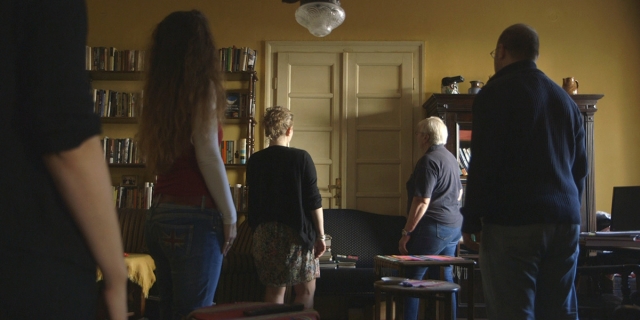CinéDOC: A Political Professor And Her Country
REVIEW
“When you can’t see the end of the crowd, your legs start shaking!” With these words, Srbijanka Turajlic described the moment when she stood in front of Serbian protesters for the overthrow of then-president Slobodan Milosevic. Filmed by the calming pole in her life - her daughter Mila Turajlic- this biographical story explores the feeling of security and intimacy a family radiates during turbulent times.
Peppered with knockabout anecdotes, the director dives into the past of her mother by painfully digging into her thoughts and motivations. The revelation of an untold hero story, who was deeply admired by thousands of students during the Yugoslavian civil war and the Serbian “Bulldozer Revolution” of 2000, starts and ends with the apartment she has inhabited since birth. The director genially combines the narrative of her mother with the narrative of two locked doors, which haven’t been opened in the apartment for decades. As the plot unfolds, light is shed on both, the leading actor and the leading object.
This masterpiece puts to the forefront resonating speeches by Srbijanka, triggering a sense of feminist political engagement during times where Yugoslavia was gripped by male and religious ignorance. Her passion for justice resembles a mix of Erin Brockovich and Joan of Arc, calling for a fair and humane society marked by people standing up for their dreams. The metamorphosis of her ideas into words reaches a poetic structure combined with an energetic expression. Yet, her intellectualism doesn’t come short as her arguments are based on common sense, which was missing in the nationalistic, impossible-to-fulfill promises of Serbian politicians throughout the decades.
The portrayal of such a strong character carries a heavy weight as it juxtaposes the steadfastness of traditions and the excitement for change. Srbijanka’s constant unhappiness with the political status quo backfires as her hate toward communist Yugoslavia transforms into political apathy during Milosevic’s authoritarian rule. Despite these outside changes, she stands in her apartment refusing to leave a place filled with memories of her parents. Her love for her home is encapsulated as a permanently evolving environment is a mirror reflection of contemporary Serbian society.
Spine-chilling tapes of marking moments of Serbian history put Srbijanka's life trajectory at the same pulse of the country she lives in. A rare and creative success, in which the person and the country walk through history together experiencing the same heartache. Her witty and humble self-characterization makes her a lovable hero of the young and modern Serbian democracy. At the same time, her contemplative mind doesn’t shy away from nostalgia debating the “what ifs” in the painful and disastrous events of Yugoslavia.
A compelling story of family love, patriotism, and intellectualism, The Other Side Of Everything invites audiences to peek behind the scars of modern Serbia through the lenses of an empowered, society-shaping woman. Eventually, her activism and eagerness undergo a self-reflective phase shaped by old-age wisdom. As she ends up rediscovering herself, she curiously wonders about what lies behind the locked doors in her own apartment too.
By Benjamin Music
Don't miss more great CineDoc films this weekend!
Related stories











